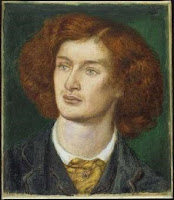The Victorian poet Algernon Charles Swinburne is probably best known for his 1866 book Poems and Ballads, but the year before that he published a rather curious verse drama called Atalanta in Calydon.
Just as Swinburne's hero Percy Shelley had written Prometheus Unbound inspired by a lost play by Aeschylus, Atalanta in Calydon takes as its jumping-off point a lost play by Euripides, Meleager. At the beginning of his own drama, Swinburne quotes a Greek fragment from Meleager, roughly translated as: "Do good to them while they live, for every man when he is dead is earth and shade, and nothingness comes to nothing."
Atalanta in Calydon tries to mimic Greek tragedy in form as well as content. Greek dramas typically began with a prologue prior to the entrance of the chorus. In some cases, like Antigone by Sophocles, this prologue was a dialogue between two characters, but Euripides frequently had a single actor relating the prologue, often portraying a character who might never again appear in the play. This is what Swinburne does, having a "Chief Huntsman" recite a hymn to Artemis at the beginning of the play.
The huntress goddess is also honored by the chorus, which sings a classical parados while entering. Their opening lines are frequently anthologized:
When the hounds of spring are on winter's traces,
The mother of months in meadow or plain
Fills the shadows and windy places
With lisp of leaves and ripple of rain;
And the brown bright nightingale amorous
Is half assuaged for Itylus,
For the Thracian ships and the foreign faces,
The tongueless vigil and all the pain.
The fact that the chorus is singing about Philomela and Procne hardly bodes well. To avenge the rape of her sister Philomela, Procne murdered her own son Itylus and fed his flesh to her husband, the King of Thrace, who was also Philomela's rapist. In the world of this play, children are precious, but siblings more so.
Atalanta, the title character, is not so much the protagonist of the play as is Althea. The legendary mother of Meleager, Althea had heard the Fates say that her son's life would only last as long as a brand burning in the fire. She plucked the brand from the fire, doused its flames, and preserved it so that her son might live. Althea relates this story to the chorus, who then sing a new hymn:
Before the beginning of years
There came to the making of man
Time, with a gift of tears;
Grief, with a glass that ran;
Pleasure, with pain for heaven;
Summer, with flowers that fell;
Remembrance fallen from heaven,
And madness risen from hell;
Strength without hands to smite;
Love that endures for a breath:
Night, the shadow of light,
And life, the shadow of death.
This grim view of existence precedes the entrance of Meleager, who catalogs all of the heroes assembled to hunt the famous Calydonian boar that is wreaking havoc on the land. It is only after the chorus sings another hymn that Atalanta finally enters. Meleager praises her virtue and beauty, but the other members of the hunting party just want him to shut up so they can go after the boar.
Atalanta is a great huntress, which is why Meleager invited her along on the boar hunt to begin with, but the men want nothing to do with her. Meleager's sexist uncle Plexippus goads him, saying, "Why, if she ride among us for a man, / Sit thou for her and spin; a man grown girl / Is worth a woman weaponed...." Later, he suggests the way she can help with the hunt is by being a human sacrifice. Atalanta speaks up for herself, though, and proclaims her own worthiness.
Ultimately, Atalanta not only joins in with the hunt, but even helps to kill the boar. After Althea gets this news, however, she receives darker tidings. Her two brothers have been killed, and by the hands of her own son. A messenger relates how Meleager tried to give the boar's head and hide to Atalanta, but this enraged Plexippus and his brother Toxeus, who assaulted her. Defending Atalanta, Meleager killed both his uncles, an act that sends Althea into a rage.
Of course, Althea had the means to exact revenge on her son. She burns the brand she once plucked from the fire, and Meleager wastes away and dies. Greek tragedies frequently ended with a kommos, or mixed song shared by both the chorus and main characters. During the final kommos in Atalanta in Calydon, Meleager and Atalanta say their final farewells, and then the young man enters eternal night.
Swinburne went on to write other plays in imitation of older styles, and Poems and Ballads contains a verse drama called The Masque of Queen Bersabe, written in a medieval style and subtitled A Miracle-Play. The poetry of Atalanta in Calydon has had a longer-lasting impact, though.

